Current News
/ArcaMax

Newark airport radar loss left controllers blind for 90 seconds
WASHINGTON — Air traffic controllers guiding planes bound for Newark Liberty International Airport lost radar and radio communication for more than a minute early last week before flights at the key hub were snarled for days, according to people familiar with the matter.
The outage of those key systems occurred on April 28 and lasted nearly ...Read more

Sen. Schumer calls for probe into FAA operations amid ongoing Newark airport delays
Senate Minority Leader Chuck Schumer on Monday called for a federal investigation of the FAA amid ongoing delays at Newark Airport.
“The chaos at Newark Airport could very well be a national harbinger if all these issues aren’t fixed, and if the FAA can’t get real solutions to these problems off the ground,” Schumer said. “(I)t is ...Read more
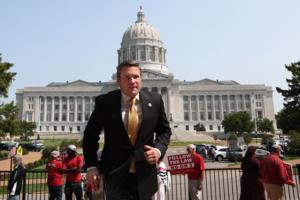
Critics say Missouri GOP law fighting abortion is a 'Let Politicians Lie Act'
JEFFERSON CITY, Mo. — When Missouri Gov. Mike Kehoe campaigned for office last year, he declared, “the pro-life community does not need quitters” if abortion returned to the state.
At a closed-door ceremony inside his Capitol office last month, the Republican chief executive signed the first measure intended to help attack abortion access...Read more

Israel vows to step up Gaza fighting, set to hold more territory
TEL AVIV, Israel — Israel’s security Cabinet voted to intensify military operations in Gaza and call up of tens of thousands of extra reservists, while also deciding on a means of distributing aid in the Palestinian territory.
The vote in the early hours of Monday followed a long discussion and was unanimous regarding the expansion of armed...Read more

Trump administration offers undocumented immigrants $1,000 to leave the country
The Trump administration announced a plan Monday to try to ramp up the number of deportations: paying unauthorized immigrants $1,000 if they return to their home country voluntarily.
The Department of Homeland Security called the plan a “historic opportunity for illegal aliens,” noting in a news release that it would also pay for travel ...Read more
Man in custody escapes at Sea-Tac Airport, takes light rail to Seattle's Capitol Hill station
SEATTLE — Seattle police are searching for a man who escaped custody Sunday morning at the Seattle-Tacoma International Airport before fleeing in handcuffs by light rail.
According to an airport spokesperson, Sedric T. Stevenson — described as a 5-foot-8 Black man with dreadlocks — was wanted out of Bowling Green, Kentucky, on unspecified...Read more

'My Social Security is my Social Security': With Trump, Musk and DOGE, will it stay that way?
OAKLAND, Calif. — A hand-crafted sign outside the downtown Social Security Administration office mimicked a street sign, depicting the intersection of “Prosecute” and “Trump.” The chants came from about 50 people surrounding it, holding furious signs aimed at President Donald Trump and Elon Musk: “Hands off! Hands off! Hands off!” ...Read more

AG Dana Nessel drops charges against group arrested in University of Michigan pro-Palestinian camps
ANN ARBOR, Mich. — Officials have dropped charges against a group accused of trespassing and resisting police when police removed a pro-Palestinian student encampment at the University of Michigan last May.
“When my office made the decision to issue charges of trespassing and resisting and obstructing a police officer in this matter, we did...Read more

Venezuelan opposition leader Edmundo González hospitalized in Spain
Venezuelan opposition leader Edmundo González has been hospitalized in a public health facility in Spain following a sudden episode of low blood pressure.
González, widely recognized by the United States and several other nations as the legitimate president of Venezuela, is reportedly in stable condition.
“I am receiving excellent care ...Read more
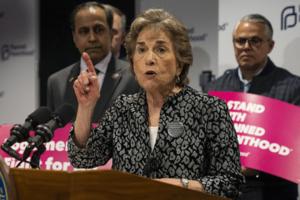
US Rep. Jan Schakowsky, Illinois congresswoman since 1999, announces she will not seek another term next year
CHICAGO — U.S. Rep. Jan Schakowsky, who represented Chicago's north suburbs in Congress for more than two and a half decades, announced Monday she will not seek a 15th term next year.
“This is the official, that I’m not going to run again for Congress, and there are pluses to that,” Schakowsky, 80, said at an Ultimate Women’s Power ...Read more

Trump administration offers $1,000 to immigrants who return home voluntarily
The Trump administration is offering $1,000 and travel assistance to undocumented immigrants who go back their own countries voluntarily, the Department of Homeland Security announced Monday.
The immigrants who use the CBP Home App — the same mobile platform previously used under the Biden administration to facilitate lawful entry ...Read more

Trump administration offers undocumented immigrants $1,000 to leave the country
The Trump administration announced a plan Monday to try to ramp up the number of deportations: paying undocumented immigrants $1,000 if they return to their home country voluntarily.
The Department of Homeland Security called the plan a “historic opportunity for illegal aliens,” noting in a news release that it would also pay for travel ...Read more

Opposition leader Machado urges US to hold firm on Venezuela sanctions as Chevron pushes to stay
As Chevron seeks to persuade the Trump administration to allow it to continue producing oil in Venezuela, opposition leader María Corina Machado argues that such a move would be counterproductive, saying it would only serve to rescue strongman Nicolás Maduro from the precarious position he now finds himself in, thanks to sanctions imposed by ...Read more

Karen Read retrial hits Day 9 with the fateful night in question
DEDHAM, Mass. — Two witnesses who say they visited 34 Fairview Road in Canton at around the time Karen Read allegedly struck and killed John O’Keefe testified that they didn’t see the victim in or near the vehicle at the home.
Read, 45, of Mansfield, faces charges including second-degree murder in the death of O’Keefe, a Boston police ...Read more
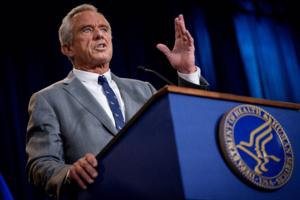
Coalition of states sues to block Trump administration cuts to health department
A coalition of states sued the Trump administration Monday to block sweeping cuts to the U.S. Department of Health and Human Services, arguing they are unconstitutional and endanger Americans.
The lawsuit specifically challenges department Secretary Robert F. Kennedy Jr.’s March 27 directive firing 10,000 full-time HHS employees, ...Read more
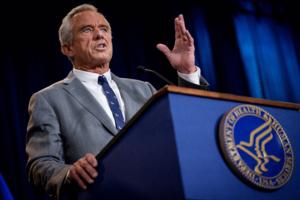
Rep. Brittany Pettersen asks RFK Jr. to maintain funding for naloxone, invokes mom's opioid battle
U.S. Rep. Brittany Pettersen implores U.S. Health and Human Services Secretary Robert F. Kennedy Jr. not to slash funding for naloxone in a letter the Colorado congresswoman sent Monday.
The medication has proven extremely effective in stopping opioid overdoses, a leading cause of death among young people. The Lakewood Democrat personalized her...Read more
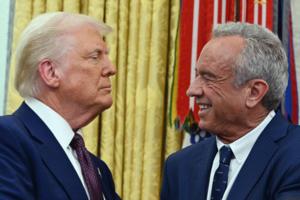
Trump team's $500 million bet on old vaccine technology puzzles scientists
The Trump administration’s unprecedented $500 million grant for a broadly protective flu shot has confounded vaccine and pandemic preparedness experts, who said the project was in early stages, relied on old technology and was just one of more than 200 such efforts.
Health and Human Services Secretary Robert F. Kennedy Jr. shifted the money ...Read more

3 dead, 9 missing after suspected smuggling boat capsizes off Del Mar in San Diego County
SAN DIEGO — A search was underway early Monday after a suspected smuggling boat capsized off Del Mar, killing three people.
Early reports indicated nine people were missing and four survivors were located, a U.S. Coast Guard spokesperson said.
The overturned boat was discovered just north of Torrey Pines State Beach around 6:30 a.m.
A ...Read more

Trump directs Bureau of Prisons to rebuild and reopen Alcatraz. Can he do that?
President Donald Trump said Sunday that he was ordering the FBI to reopen the Alcatraz Federal Penitentiary, the historic prison on an island off of San Francisco that has been closed since 1963.
“REBUILD, AND OPEN ALCATRAZ!” he wrote in a post on Truth Social. “When we were a more serious Nation, in times past, we did not hesitate to ...Read more

Medicaid expansion group sues Florida over new ballot initiative restrictions
TALLAHASSEE, Fla. — A group behind a petition drive to expand Medicaid is suing the state over a law signed by Gov. Ron DeSantis that erects even more barriers to getting citizen initiatives on the ballot.
Florida Decides HealthCare said in a press release that the new law is unconstitutional and “significantly undermines Florida’s ...Read more
Popular Stories
- Trump plans 100% tariff on foreign movies, escalating trade war
- Minn. woman's fight to renew her 92-year-old mother's Medicaid highlights the growing problem of short-staffed counties
- Trump says he plans to reopen Alcatraz as a federal prison
- Asylum-seeking Honduran mother is still sitting in a Colo. ICE center six months after being detained
- Romania far-right leader wins first- round vote, poll shows





